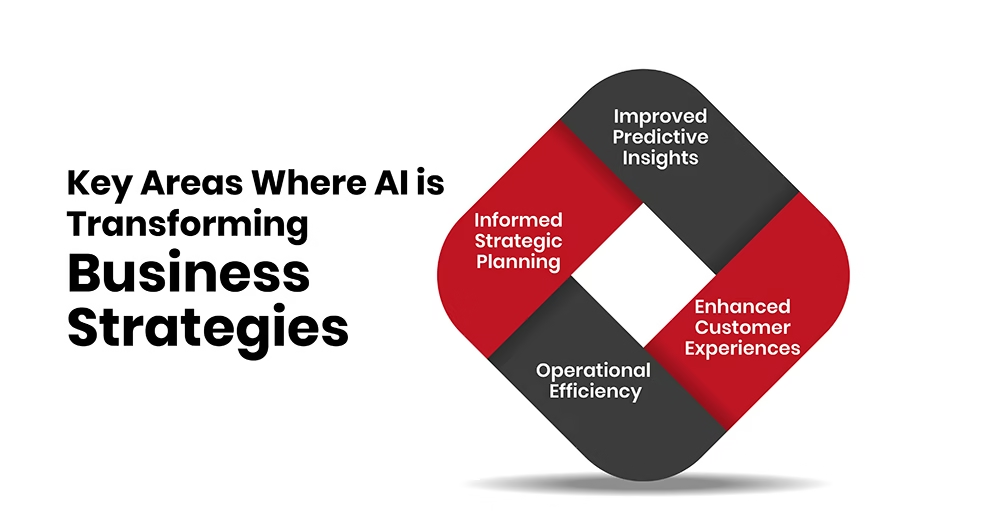Contents
1. Introduction
AI in Business Artificial intelligence (AI) is no longer a futuristic concept; it’s a present-day reality reshaping the business landscape. In 2025, AI’s integration into various business facets is not just enhancing efficiency but also driving innovation and competitiveness. Understanding the future of AI in business is crucial for organizations aiming to thrive in this dynamic environment.
2. Key AI Trends in Business for 2025
a. AI-Powered Decision Making
AI algorithms are really revolutionized and how the business is run by activating data-handled decisions. 1 These sophisticated systems can analyze with speed via enormous data sets and with the level of expansion and with levels that cross human abilities. By identifying two complex patterns, correlations and deviations, the AI business provides an action to inform the strategic plan. 3 It increases the accuracy of predictions, better risk assessment and eventually, more effective business strategies. 4 AI’s ability to process complex information quickly allows organizations to create timely and well -informed alternatives, and give them a significant competitive advantage in today’s dynamic market AI in Business.
b. Hyper-Personalization
AI enables businesses to offer personalized experiences to customers by analyzing behavior patterns and preferences, leading to increased customer satisfaction and loyalty.
c. Automation of Routine Tasks
AI automates repetitive tasks, freeing up human resources for more complex and creative endeavors. This shift enhances productivity and reduces operational costs.
3. Real-World Applications of AI in Business
a. Goldman Sachs’ AI Integration
Goldman Sachs has implemented AI tools like the GS AI Assistant, enhancing productivity across various departments by automating tasks such as investment research translations and multilingual communications. Business Insider
b. SMEs Embracing AI for Efficiency
Small and medium-sized enterprises are adopting AI for tasks like staff scheduling and inventory management, resulting in productivity boosts ranging from 27% to 133%. Latest news & breaking headlines
c. Uber’s Focus on AI Literacy
Uber emphasizes the necessity of AI proficiency among employees, with plans to implement internal training programs to ensure effective AI utilization across all levels. Business Insider

4. Strategies for Integrating AI into Business Operations
- Invest in AI Training: Equip employees with the necessary skills to work alongside AI tools effectively.
- Implement AI Incrementally: Start with pilot projects to assess AI’s impact before full-scale implementation.
- Collaborate with AI Experts: Partner with AI specialists to tailor solutions that align with business objectives.
- Monitor and Evaluate: Continuously assess AI’s performance and make adjustments as needed to optimize outcomes.
5. Challenges and Considerations
- Data Privacy Concerns: Ensuring the protection of sensitive information is paramount when implementing AI solutions.
- Ethical Implications: Businesses must consider the ethical aspects of AI, including bias and transparency.
- Integration Complexity: Seamlessly integrating AI into existing systems can be complex and requires careful planning.
6. Conclusion
The future of AI in business is marked by transformative trends that offer opportunities for growth and innovation. By understanding and strategically implementing AI, businesses can enhance efficiency, personalize customer experiences, and maintain a competitive edge in the evolving market landscape.
7. FAQs
Q1: How can small businesses start integrating AI?
Small businesses can begin by identifying repetitive tasks suitable for automation and exploring affordable AI tools tailored to their needs.
Q2: What industries are most impacted by AI in 2025?
Industries such as finance, healthcare, retail, and manufacturing are experiencing significant transformations due to AI integration.
Q3: Is AI implementation cost-effective for all business sizes?
While initial investments may vary, AI solutions are increasingly accessible and scalable, making them cost-effective for businesses of all sizes.
Note: For a comprehensive understanding and the latest updates on AI trends in business, refer to reputable sources and industry reports.




